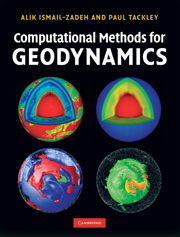Book contents
- Frontmatter
- Contents
- Foreword by Gerald Schubert
- Preface
- Acknowledgements
- 1 Basic concepts of computational geodynamics
- 2 Finite difference method
- 3 Finite volume method
- 4 Finite element method
- 5 Spectral methods
- 6 Numerical methods for solving linear algebraic equations
- 7 Numerical methods for solving ordinary and partial differential equations
- 8 Data assimilation methods
- 9 Parallel computing
- 10 Modelling of geodynamic problems
- Appendix A Definitions and relations from vector and matrix algebra
- Appendix B Spherical coordinates
- Appendix C Freely available geodynamic modelling codes
- References
- Author index
- Subject index
- Plates section
9 - Parallel computing
Published online by Cambridge University Press: 05 June 2012
- Frontmatter
- Contents
- Foreword by Gerald Schubert
- Preface
- Acknowledgements
- 1 Basic concepts of computational geodynamics
- 2 Finite difference method
- 3 Finite volume method
- 4 Finite element method
- 5 Spectral methods
- 6 Numerical methods for solving linear algebraic equations
- 7 Numerical methods for solving ordinary and partial differential equations
- 8 Data assimilation methods
- 9 Parallel computing
- 10 Modelling of geodynamic problems
- Appendix A Definitions and relations from vector and matrix algebra
- Appendix B Spherical coordinates
- Appendix C Freely available geodynamic modelling codes
- References
- Author index
- Subject index
- Plates section
Summary
Introduction
This chapter introduces only the basics of parallel computing and does not intend to cover all aspects of this topic. The major challenge in writing this chapter was to keep up with the progress in computer science, which, compared with mathematics and computational methods, is a rapidly evolving discipline, and many current approaches to parallel computing may become almost useless in about a decade or so. Meanwhile many geodynamic models cannot be solved today on a single processor because of memory or time restrictions, and hence parallel computers should be employed to run the models. Researchers dealing with computational geodynamics should know at least the basics of parallel coding and computing, and that motivated us to write this chapter. We discuss here the principal differences between sequential and parallel computing, shared and distributed memory, introduce a domain decomposition approach, message passing and MPI, analyse the cost of parallel processing, and present simple examples of codes for parallel computing. We refer the reader to the books and journals on parallel computing where the topic is described in much detail (see, for example, Lipovski and Malek, 1987; Crichlow, 1988; Fox et al., 1988; Gibbons and Rytter, 1988; Fountain, 1994; Foster, 1995; Hord, 1999; Roosta, 2000; Snyder and Lin, 2008; Barney, 2009; Elsevier's Parallel Computing Journal and Journal of Parallel and Distributed Computing, World Scientific's International Journal of High Speed Computing).
- Type
- Chapter
- Information
- Computational Methods for Geodynamics , pp. 197 - 215Publisher: Cambridge University PressPrint publication year: 2010



